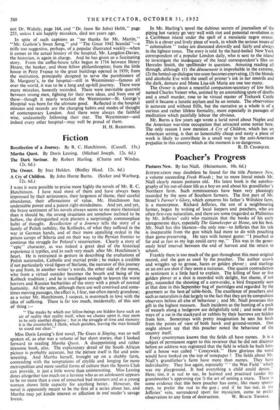Fiction
The Owner. By Inez Holden. (Bodley Head. 12s. 6d.)
I WISH it were possible to praise more highly the novels of Mr. R. C. Hutchinson. I have read most- of them and have always been impressed by their seriousness, their largeness of theme, their careful abundance, their affirmations of value. Mr. Hutchinson has undeniable power and a patent right-mindedness. And yet, and yet, the brave sentiment of his novels always seems to me more rhetorical than it should be, the strong situations are somehow inclined to be hollow, the distinguished style plasters a surprisingly commonplace habit of thought. Recollection of a Journey tells the story of a family of Polish nobility, the Kolbecks, of what they suffered in the war at German hands, and of their more appalling ordeal in the prison camps of Siberia and on their way to the Persian frontier to continue the struggle for Poland's resurrection. Clearly a story of "epic" character, as was indeed a great deal of the historical experience it typifies, and as such very much after Mr. Hutchinson's heart. He is restrained in gesture in describing the exaltations of Polish nationalist, Catholic and martial pride ; he makes a credible if not particularly vivid figure of Stefanie, the narrator of this journey to and from, in another writer's words, the other side of the moon, who from a virtual outsider becomes the breath and being of the Kolbeck tradition ; and he is intelligent enough to leaven the worst horrors and Russian barbarities of the story with a pinch of normal humanity. All the same, although there are well contrived and some- times moving passages, the effect is, I fear, too often merely grandiose; as a writer Mr. Hutchinson, I suspect, is overmuch in love with the idea of suffering. There is far too much, incidentally, of this sort of thing :— " The masks by which our fellow-beings are hidden have such an air of reality that reality itself, when we chance upon it, may seem to be only another disguise ; but in the struggle of time and memory it is the counterfeit, I think, which perishes, leaving the man himself to stand out clear."
Miss Doris Lessing's first novel, The Grass is Singing, was so well spoken of, as also was a volume of her short stories, that I looked forward to reading Martha Quest. A disappointing and rather tiresome book, alas. The explanatory detail of the South African picture is probably accurate, but the picture itself is flat and unin- teresting. And Martha herself, brought up on a shabby farm, contending with the temptations of citylife and longing for more metropolitan and more soulful forms of culture than the Sports Club can provide, is just a little worse than uninteresting. Miss Lessing dotes altogether too much on a heroine who as an adolescent appears to be no more than a case of conceited bad manners.and as a young woman shows little capacity for anything better. However, the novel is apparently meant to be the first of a series about her, and Martha may yet kindle interest or affection in one reader's savage breast. In Mr. Harling's novel the dubious secrets of journalism of the piping hot variety go very well with riot and potential revolution in a Caribbean island under the spell of a messianic negro orator. This is a clever and lively piece of work, in which the serious issues of " colonialism " today are discussed shrewdly and fairly and always in the lightest tones. The story is told by the hard-boiled New York correspondent of a popular London daily, who is sent to the island to investigate the inadequacy of the local correspondent's files on Hercules Smith, the spellbinder in question. Amusing reading all through, although (1) the denouement is improbable in the extreme, (2) the hotted-up dialogue too soon becomes enervating, (3) the blonde and alcoholic Eve with the smell of printer's ink in her nostrils and the dark, demure and Mona Lisa-ish Maria are one too many.
The Owner is about a resentful companion-secretary of low birth
named Charles Veneer who, assisted by an astonishing spate of deaths and a small murder, rose to be virtual master of Trehawk CaStle until it became a lunatic asylum and he an inmate. The observation is accurate and without frills, but the narrative as a whole is of a curious and rather lifeless formality, more especially in passages of meditation which painfully labour the obvious.
Mr. Burns a few years ago wrote a lurid novel about Naples and
the American war-time occupation that attracted some notice here. The only reason I now mention A Cry of Children, which has an American setting, is that so lamentably cheap and nasty a piece of work is likely to contribute in a small way to the anti-American prejudice in this country which at the moment is so dangerous.
R. D. CHARQUES.


































 Previous page
Previous page